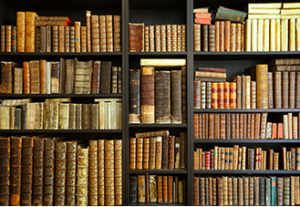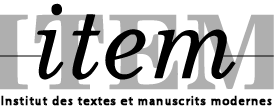Séminaire :
Séminaire franco-nordique "Écrire et traduire au féminin" /2025-202615/06/2026 - 16/06/2026, Oslo

CFP
International Conference
Creativity in Literary Writing:
Exploring Multilingual Archives*
Oslo University
15-16 June 2026
*French version below
The study of manuscripts and other archival materials is crucial to understanding the dynamics of literary writers’ creative process. Authors’ use of multiple languages has gained increased scholarly interest in the past few decades. But multilingual writing has a long tradition, perhaps partly due to the affordances it offers to the writer. Reminding us that the mind is embedded, embodied, enactive and extended (4E cognition), cognitive theories offer tools and concepts that complement traditional genetic criticism approach and can help shed new light on the creative ecologies of literary writing and translating.
At this conference, we invite speakers to discuss literary creativity through the lens of multilingual manuscripts and archival materials. We particularly encourage papers on female authors, artists and translators as well as cognitive approaches. We welcome case studies across periods and languages/geographical areas, across genres (prose, poetry, drama and comics) and disciplines (literary studies; translation studies; visual arts; cognitive science) and/or theoretical and methodological contributions.
Questions under discussion include:
How can the study of multilingual manuscripts shed new light on the creative process of (female) writers? And how can, vice versa, discussions of creativity and cognition elucidate the theoretical potential and/or limits of literary multilingualism, translation and genetic criticism?
Topics may include but are not limited to:
– the creative ecologies of multilingual manuscripts and archival documents;
– gender aspects of literary multilingualism, and more specifically the creative process of multilingual female writers;
– literary genres and multilingualism;
– the creativity of multilingual writing in cultural transfers;
– the cognitive affordances of multilingual writing: plurilingual strategies as resource and/or as constraint;
– the interplay between the linguistic, material and visual in the creative writing process;
– embodied aspects of cognition in creating multilingual and multimodal texts;
– sociological, historical and material dimensions of multilingual writing;
– self-translation as a creative strategy.
Languages of event: French and English
If you’re interested to participate, please send a working title, a brief abstract of 200-250 words, and a short bio to olga.anokhina@cnrs.fr, mickaelle.cedergren@su.se, and stijn.vervaet@ilos.uio.no by 20 January 2026.
* There is no registration fee for this conference.
** Travel and accommodation expenses are the responsibility of the participants.
Colloque international
Le processus de création littéraire :
l’exploration à travers les archives plurilingues
Université d’Oslo
15-16 juin 2026
L’étude des manuscrits et autres documents d’archives est essentielle pour comprendre la dynamique du processus créatif des écrivains. L’utilisation de plusieurs langues par les auteurs suscite un intérêt croissant chez les chercheurs depuis quelques décennies. Mais l’écriture plurilingue est une tradition ancienne, peut-être due en partie aux possibilités créatives et cognitives qu’elle offre à l’écrivain. Sachant que l’esprit est ancré, incarné, enactif et étendu (cognition 4E), les théories cognitives offrent des outils et des concepts qui constituent un complément à l’approche génétique traditionnelle et contribuent à apporter un éclairage nouveau sur les écologies créatives de l’écriture littéraire et de la traduction.
Nous invitons les intervenants à étudier le processus de créativité littéraire à travers le prisme des manuscrits plurilingues et des archives. Nous encourageons particulièrement les communications sur les femmes –autrices, artistes et traductrices–, ainsi que les approches cognitives. Dans le cadre de cette conférence, nous acceptons les études de cas couvrant différentes périodes et langues/zones géographiques, différents genres littéraires (prose, poésie, théâtre et bandes dessinées) et différentes disciplines (études littéraires, traduction, sciences cognitives, etc.).
Les sujets abordés au cours de cette conférences porteront sur les questions suivantes :
Comment l’étude des manuscrits plurilingues peut-elle apporter un éclairage nouveau sur le processus créatif des écrivain(e)s ? Et inversement, comment les discussions sur la créativité littéraire et la cognition peuvent-elles éclairer le potentiel théorique et/ou les limites du plurilinguisme littéraire, de la traduction et de la critique génétique ?
Sans être exhaustifs, les thèmes abordés lors de cette conférence peuvent inclure :
– les écologies créatives des manuscrits plurilingues et des documents d’archives ;
– les aspects liés au genre dans le plurilinguisme littéraire, et plus particulièrement le processus créatif des femmes écrivains plurilingues ;
– les genres littéraires et le plurilinguisme ;
– la créativité de l’écriture plurilingue dans les transferts culturels ;
– les possibilités cognitives de l’écriture plurilingue : les stratégies plurilingues comme ressource et/ou contrainte ;
– l’interaction entre les aspects linguistiques, matériels et visuels dans le processus d’écriture créative ;
– les aspects cognitifs dans la création de textes plurilingues et multimodaux ;
– les dimensions sociologiques, historiques et matérielles de l’écriture plurilingue ;
– l’autotraduction comme stratégie créative.
Langues de communication : français et anglais
Si vous souhaitez participer, veuillez envoyer un titre de votre communication, un bref résumé de 200 à 250 mots et une courte biobibliographie avant le 20 janvier 2026 aux organisateurs :
olga.anokhina@cnrs.fr, mickaelle.cedergren@su.se et stijn.vervaet@ilos.uio.no.
* Il n’y a pas de frais d’inscription pour ce colloque.
** Les frais de déplacement et d’hébergement sont à la charge des participants.
BIBLIOGRAPHY / BIBLIOGRAPHIE
References on cognitive approaches to literary creativity and manuscript studies/genetic criticism
The literature in the field of cognitive literary studies is vast; below follow a few selected publications that are relevant for cognitive approaches to literary creativity and manuscript studies/genetic criticism.
(1) For cognitive approaches to the creative process in literature, including the study of manuscripts, see
Kinderman, William, and Joseph E. Jones, editors. Genetic Criticism and the Creative
Process: Essays from Music, Literature, and Theater. University of Rochester Press, 2009.
Van Hulle, Dirk. Genetic Criticism: Tracing Creativity in Literature. Oxford University Press, 2022.
Kukkonen, Karin. Creativity and Contingency in Literary Writing. London: Bloomsbury forthcoming January 2026.
(2) On writing as an extended cognitive activity that expands and transforms our thinking, see the classical article by
Menary, Richard. “Writing as thinking.” Language sciences 29.5 (2007): 621-632.
(3) For a cognitive-ethnographic approach to the creation of comics, see
Haraldsen, Mats, and Sarah Bro Trasmundi. “Making a comic: Cognitive event analysis of narrative affordance navigation.” Cogent Arts and Humanities (forthcoming 2025).
(4) On 4E Cognition, see for example
Leon de Bruin, Shaun Gallagher, and Albert Newen (eds). The Oxford Handbook of 4E Cognition. Edited by, Oxford University Press, 2018.
(5) For a good overview of current cognitive approaches to literature in general, see
Alber, Jan and Ralf Schneider (eds): The Routledge Companion to Literature and Cognitive Studies. Taylor & Francis, 2025.












